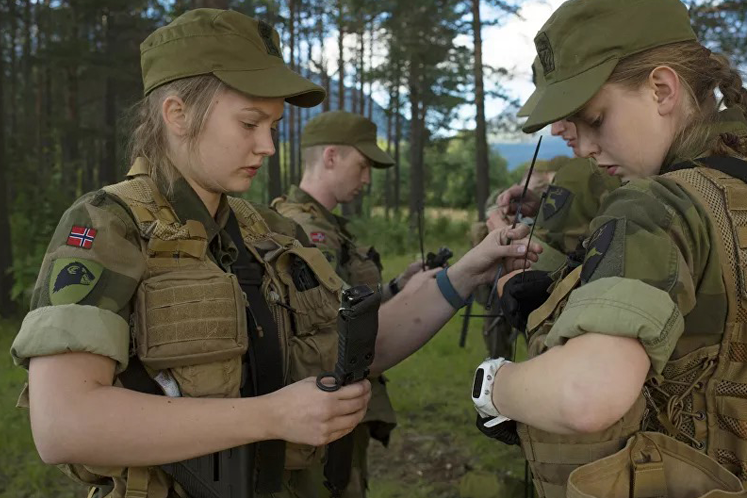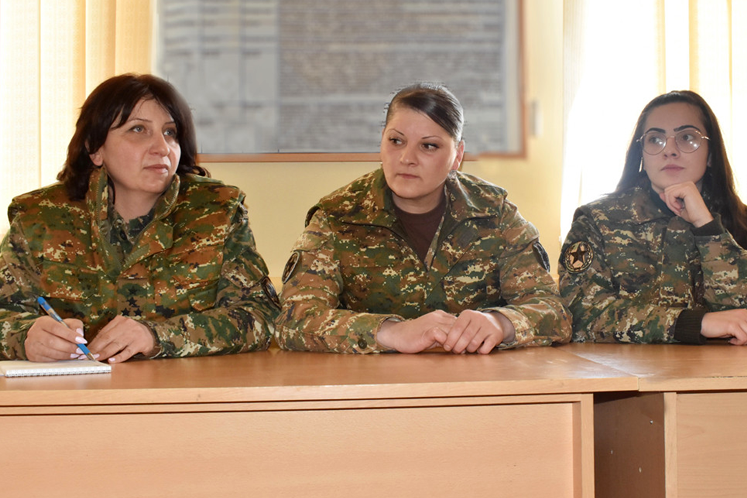From Finland to Armenia: Diverse approaches to increasing women’s participation in armed forces
In March, Denmark announced plans to extend conscription to women from 2026, aiming for a more versatile defence force. This move reflects global trends towards gender equality in the armed forces. While some envision conscription as progress for women, others argue that conscription symbolizes growing militarization, hindering true gender equality and sustainable development.
To explore different approaches to increasing the participation of women, DCAF organized an expert discussion in December 2023, with representatives from armed forces in Armenia, Finland, Lithuania, Norway, and Switzerland.
As has been widely documented by militaries, NATO and the UN, the full and equal inclusion of women in armed forces significantly enhances the effectiveness of military operations, including in combat.
FINLAND: SUPPORTING A VOLUNTARY APPROACH
Finland’s approach to conscription involves compulsory service for men and voluntary participation for women, who, once they opt in, receive the same training and service conditions as their male counterparts. The Finnish Defence Forces have developed comprehensive support systems to facilitate the integration of women, including mentorship programmes, gender sensitivity training, and measures to prevent sexual harassment. Additionally, the Finnish Defence Forces have explored ways to increase voluntary female participation, such as specialized recruitment campaigns targeting women.
NORWAY: MANDATORY CONSCRIPTION FOR ALL
Norway's policy of universal conscription, introduced in 2016, requires both men and women to serve, marking a significant step towards gender equality in the military. The Norwegian Armed Forces have adapted their infrastructure and culture to support female conscripts with gender-neutral facilities, comprehensive health services, and strict policies against discrimination and harassment. This inclusive approach promotes a shared sense of national duty and equality among citizens. Additionally, the Norwegian Armed Forces established Jegertroppen (Hunter's Troop), an all-female conscript platoon with female-only training led by female instructors. This unit was created to meet the operational need for female special operations soldiers and recruits women through rigorous selection criteria and physical standards.

Female army recruits attending a base training at the armored battalion in Setermoen, northern Norway. Photo: Norwegian Armed Forces
SWITZERLAND: EMPHASIS ON FLEXIBILITY
Female Swiss citizens are not subject to compulsory service but can volunteer for all military roles. To attract more women to enlist, Switzerland focuses on enabling personnel to balance their military commitments with personal life by offering part-time roles and paid parental leave. This enables women to serve in various capacities, from combat to support and administrative positions. Switzerland’s approach aims to make military service more appealing and accessible to women, recognizing their diverse needs and circumstances.
ARMENIA: A NEW MODEL OF SHORTENED OBLIGATIONS
Armenia has recently introduced a new model of military service to encourage more women to enlist. Once they start their service, they are obliged to serve only six months - shorter than the two-year minimum term for men. This new system broadens the role of women in the military and aims to balance the need for increased military personnel with the goal of promoting women’s contribution to national defence.

Women's Council in Armenia discussing issues related to women's involvement in the armed forces, protection of the rights, promotion of advancement of female service members, and provision of equal opportunities. Photo: Ministry of Defence of the Republic of Armenia
In all countries, conscription of women into armed forces faces challenges due to gender stereotypes and misconceptions about their capabilities. Experts identify these key strategies to ensure that women have the opportunity to participate meaningfully in the armed forces:
- Most importantly, change institutional culture within militaries to embrace gender equality, with strong leadership and accountability mechanisms.
- Accommodate family commitments by offering part-time roles and paid leave for maternity, paternity, and adoption.
- Adopt targeted action plans and campaigns to encourage women to explore opportunities in the military.
- Highlight female role models and increase the visibility of women pursuing military careers.
- Ensure equal opportunities for training, advancement, and professional development.
- Enforce policies against sexual harassment, bullying, etc. and strengthen complaint processes.
- Adapt infrastructure and equipment to be inclusive and supportive of women.
 Share on Facebook
Share on Facebook Share on Linkedin
Share on Linkedin Share on Twitter
Share on Twitter